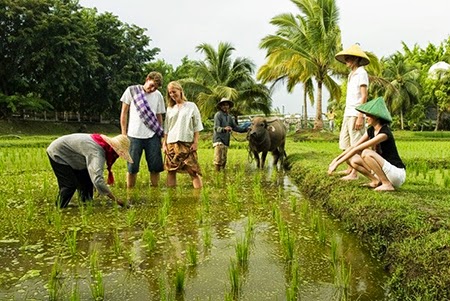Vĩnh Long is a
province located in the Mekong Delta of southern Vietnam. Its capital is Vĩnh
Long. Its population is 1,023,400 and its area is 1,475 km².
 |
| Mỹ Thuận Bridge from Tien Giang to Vinh Long |
You may know About Vietnam that situated
between the Tien and the Hau rivers, Vinh Long Province (Tỉnh Vĩnh Long) is
bounded by Tien Giang Province on the north, Dong Thap Province on the
north-west, Tra Vinh Province on the south-east, Hau Giang and Soc Trang
provinces on the south, and Can Tho City on the south-west.
 |
| Vĩnh Long Province Map |
Modern-day Vĩnh Long was part of Long Hồ
dinh (barrack, 營) established by the Nguyễn
lords in 1732, comprising the provinces of Bến Tre, Trà Vinh, and parts of Cần
Thơ. The area saw some of the heaviest fighting between the Tây Sơn brothers
and the Nguyễn lords in the late 18th century; in 1784 Nguyễn Huệ defeated
Siamese forces aiding Nguyễn Ánh at the Mang Thít River.

In 1951, the Southern Resistance
Administrative Committee of the newly declared Democratic Republic of Vietnam
(North Vietnam) merged Vĩnh Long and Trà Vinh provinces into Vĩnh Trà Province.
Vinh Tra existed until 1954 (however, as North Vietnam never administered the
area for a significant period of time, this arrangement was not enforced). In
1957, the government of the Republic of Vietnam (South Vietnam) formed Vĩnh
Long Province, consisting of six districts: Châu Thành, Chợ Lách (now part of Bến
Tre Province), Tam Bình, Bình Minh, Sa Đéc, and Lấp Vò. In 1961, Cái Nhum
District was split from Chợ Lách. Đức Tôn District and Đức Thành District were
added in 1962, but joined the newly formed Sa Đéc Province in 1966. As of 1975,
the province had 7 districts: Châu Thành, Chợ Lách, Tam Bình, Bình Minh, Minh Đức,
Trà Ôn, and Vũng Liêm.

After the fall of Saigon and South Vietnam
was reunited with North Vietnam, the new government merged Vĩnh Long with Trà
Vinh Province, forming Cửu Long Province in 1976. In 1991, Cửu Long was again
split into Vĩnh Long and Trà Vinh. At the time of the split, Vĩnh Long Province
consisted of one city (Vĩnh Long) and 5 districts: Long Hồ, Vũng Liêm, Bình
Minh, Tam Bình, and Trà Ôn.
In 1992, Mang Thít District was re-split
from Long Hồ District. In 2007, Bình Tân District was created.
The terrain is quite flat. The complex
network of rivers and canals make convenient transportation. The soil is rich
in alluvium, favorable for rice and various fruit cultivation.
The dry season lasts from December to April,
the rainy season last from May to November. The annual average temperature is
270C. Average rainfall is from 1,300mm to 1,500mm.
Silt from Tien and Hau rivers has raised the
level of the field. The majority of inhabitants live on farming, fruit planting
and cattle rising.
Coming to there, visitors have chance to
walk among the trees, relax in hammocks, try all kinds of delicious tropical
fruits in the gardens of An Binh and Binh Hoa Phuoc islands. Several popular
places are Mr. Sau Giao's Flower Garden, Mr. Muoi Day's Stilt-House, and Mr.
Hai Hoang's Old House.
Vinh Long has many pagodas, communal houses
such as Van Thanh Temple, Long Thanh Communal House, Tinh Xa Ngoc Vien, Phuoc
Hau, Tien Chau, Saghamangala pagodas.
 |
| Van Thanh Temple |
 |
| Phuoc Hau Pagoda |
 |
| Tịnh xá Ngọc Viên |
You may enjoy some bug like locusts and
grasshopper, but I think you have not tried cicada. Cicadas are harmless bug
for farmers. Their bodies contain kitin which is one of ingredient for treating
cold, cough, flu and some other sick. This kind of food is best provided from
Vinh Long. The cicada in Vinh Long is bigger more delicious and fatty than
others. In the summer time, you can see there are hundred people catching
cicadas in Vinh Long.
Prawns and the Basa and Tra catfish are
among the many types of fish that exist in abundance in the waters of Vĩnh
Long. Its rich, fertile soil makes Vĩnh Long an ideal location for the growing
of many exotic and delicious fruits, including the strange-looking mangosteen,
the spikey rambutan and the pungently fragrant durian. Because of Vĩnh Long's
extensive network of waterways, these fruits and many other items can be
purchased for mere pennies from the huge water-based squadron of floating
merchants.
Traveling by water is a common practice here
for such mundane tasks as grocery shopping as well as getting to restaurants
and tourist attractions located on small islets accessible only by boat.
Tourist infrastructure is still in its infancy here, but comfortable lodging
and great food can be had for very reasonable prices.
It is ideal time due to it is time of
cicada’s born and the quality of cicada is great at this time. There are many
cooking style of this food, however I think the dried cicada is a best one. It
not only is crunchy like peanuts but also fatty like cheese.
Thank you for reading my blog !





































0 nhận xét: